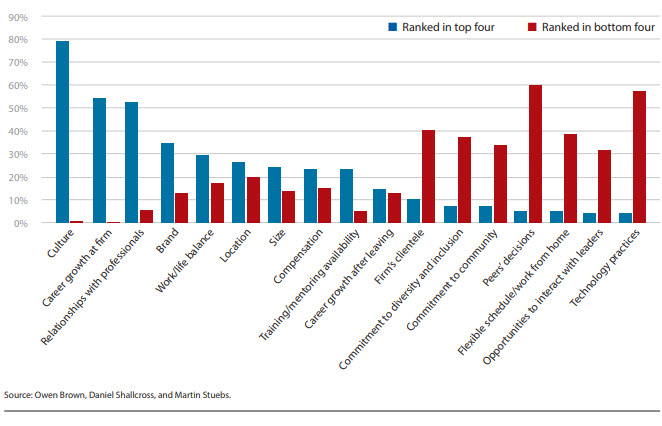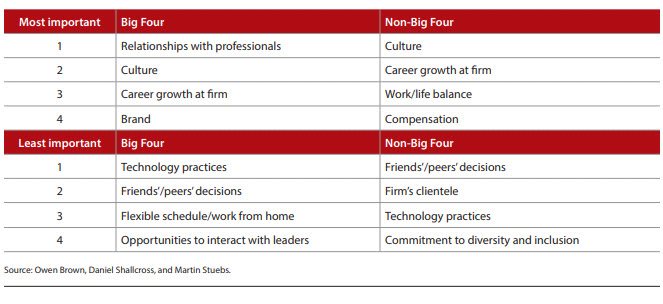- feature
- PRACTICE MANAGEMENT
What it takes for accounting firms to recruit Gen Z
Organizational culture and opportunities for career growth are the top factors today’s students seek in an employer.
Please note: This item is from our archives and was published in 2019. It is provided for historical reference. The content may be out of date and links may no longer function.

Related
Luxury liabilities: Serving high-net-worth clients
COSO creates audit-ready guidance for governing generative AI
Corporate spending accelerating toward AI in 2026
Attracting and recruiting accounting graduates is critical to the long-term success of public accounting firms. A new generation, Generation Z — or more simply, Gen Z — is entering the workforce, placing additional pressure on firms to review and, as necessary, update their recruiting practices to ensure that they remain effective at attracting top-performing students. Understanding and connecting with a new generation of accounting students can be an important factor in improving the effectiveness of recruiting programs.
In this article, we present the results of an online survey of 132 current undergraduate and graduate accounting students on the factors they consider when making an internship decision. We also identify a set of recruiting “do’s and don’ts” that accounting firms should adhere to when updating their recruiting strategies to attract Gen Z accounting students.
CHARACTERISTICS OF GEN Z
Gen Z is often described as those individuals born during the years 1996—2010. Gen Z is the first group of true “digital natives” or “screenagers.” While Millennials quickly adapted to the rise of social media and mobile messaging, Gen Zers were born into a world where the internet already existed. Compared with prior generations, Gen Z individuals are better multitaskers — shifting seamlessly between apps, devices, and conversations — and are more entrepreneurial. In fact, recent studies indicate that nearly 3 out of 4 teenagers wish to start their own business in the future. For potential employers, this entrepreneurial spirit can prove difficult to harness, leading to higher levels of turnover than previously experienced.
This group is now reaching adulthood and entering the workforce, and they bring a unique set of career expectations. For example, a recent EY survey of 1,400 Gen Z workers found that 70% believe it is more important to be seen as having a “curious or open mindset” than to have a specific skill or expertise. The EY survey also indicates that an overwhelming majority (77%) would prefer a Millennial manager to a Gen Xer or Baby Boomer.
A SURVEY OF STUDENTS’ ACCOUNTING INTERNSHIP RECRUITING EXPERIENCES
Throughout the summer of 2018, we, along with recruiters from multiple public accounting firms ranging in size from single-office to Big Four, emailed a survey link to current undergraduate and graduate college students who were previously recruited for a professional internship. In total, 132 accounting students attending 27 four-year colleges, primarily from universities located in the southwestern and southeastern United States, completed the survey.
The survey asked respondents to rank in order of importance 17 factors they might evaluate when choosing an internship, such as firm size, location, work/life balance, and opportunities for advancement. Additionally, we gave respondents the opportunity to answer open-ended questions where they could elaborate on a ranked factor, discuss a factor they considered important that was not previously included in the survey, or discuss their overall recruiting experience.
Factors students look for in an internship employer
Company culture emerged as the most influential factor in the decision-making process for students selecting an accounting internship position (see the graphic, “Factors That Influence Students’ Internship Choices,” below). The next-most-important factors were perceptions of career growth opportunities at a firm, relationships with professionals developed during the recruiting process, and perceptions of a firm’s overall brand.
These results suggest that accounting firms can improve their recruiting efforts by emphasizing and developing relationships between their current professionals and prospective interns during student recruitment. Through these relationships, firms can then highlight other factors that students identified as important, such as company culture and career growth opportunities.

Factors students consider least important in an internship employer
Students ranked the potential to use leading technology practices as one of their top four factors least often. This was somewhat surprising given the ubiquity of technology and online accessibility for Gen Z. We interpret this ranking not as an indication that Gen Z accounting students place little value on technology practice and applications, but rather that firms may find difficulty in differentiating themselves based solely on perceived technology innovation.
Other factors ranked low included the ability to interact with company leaders, flexible work schedule/work-from-home capabilities, and friends’/peers’ decisions.
Big Four vs. non-Big Four internship considerations
Within our survey results, 56 students (42%) signed with a non-Big Four firm while 76 students (58%) signed with a Big Four firm. Analyzing these two internship groups separately highlights similarities and key differences among the factors considered when selecting an internship (see the table, “Comparing Big Four and Non-Big Four Survey Responses,” below). Collectively, analyzing Big Four and non-Big Four internship considerations separately suggests that a one-size-fits-all recruiting strategy is unlikely to be successful.
From our results, it is apparent that a firm’s culture and career growth opportunities played important roles for all respondents. However, students who went to Big Four firms also ranked relationships with professionals and company brand as significant factors, while students who selected non-Big Four internships said thatwork/life balance and compensation were more important considerations.
Comparing Big Four and non-Big Four survey responses
This table shows the top four most important and bottom four least important factors that students considered when making an accounting internship decision, split by whether the student chose a Big Four accounting internship or a non-Big Four accounting internship.

Students’ thoughts on recruiting practices
The final two survey questions were open-ended ones that solicited students’ feedback about a positive recruiting event and a negative recruiting event that impacted their overall recruiting experience. Two dominant themes, one positive and one negative, arose from these questions.
Students overwhelmingly identified the organization of recruiting events and follow-up after a recruiting event as factors that positively impacted their impression of an accounting firm. For example, one Big Four signee noted that “the level of organization that was shown by the recruiting team stood out to me more than anything. I appreciated when recruiters were professional and organized.” Similarly, a non-Big Four signee said that if “events were not organized well” and firms were “taking too long to answer emails,” it negatively impacted their perceptions of a firm.
Multiple students said that they enjoyed events with fewer candidates (i.e., smaller groups), feeling like a priority (e.g., personal letters), and activity-based recruiting (e.g., bowling, scavenger hunts, etc.), again underscoring the importance of establishing personal relationships during the recruiting process.
Negativity during recruiting had an adverse effect on students’ impressions. Examples students mentioned included recruiting personnel negatively discussing other firms, having conversations that were negative about anyone (including fellow co-workers and recruits), and generally acting arrogantly. For example, one student mentioned that being recruited by a firm that “displayed a poor attitude towards inviting me into their culture” and “acted as though they were too good for me” led them to choose an internship offer from a different firm.
DO’S AND DON’TS FOR ATTRACTING GEN Z ACCOUNTING STUDENTS
Based on the survey results and informal and formal feedback through interactions with college students, we offer several recruiting do’s and don’ts that firms can consider when recruiting Gen Z accounting students (see the box, “Recruiting Do’s and Don’ts”).
A firm’s campus recruiting team must be organized to be successful. Ideally, this team should include several professionals from varying backgrounds (in terms of both experience and service line). Every recruiting contact with internship candidates should be carefully chosen, and the entire recruiting team needs to know what is expected of them. Organizing recruiting teams in this manner can help provide students with a better feel for the firm’s culture — a top-rated factor for our survey respondents.
Knowing that Gen Z students ranked career growth as a top employment factor they considered, firms of all sizes should make it a priority to communicate the opportunities they offer to grow and contribute professionally. If a firm does not have unique professional growth programs, it may want to consider developing one to promote to prospective student-interns. For example, it might diversify interns’ experiences by offering rotational opportunities across service lines, industries, and office locations.
Overall, communication is key when recruiting. Recruiting personnel should know not only what firm strengths to communicate, but also what topics to avoid (e.g., negative comments about other firms or candidates) and when to reach out to prospective internship candidates. Students made it clear in their survey responses that firms that do a poor job communicating during the recruiting process are not perceived positively. For example, waiting to email students the details of a recruiting event until just hours prior to the event or not following up with recruits after events can make a firm appear disorganized and foster a perception that recruits are not a priority.
While these suggestions would work for all firm types, we recommend that employers tailor events, conversation topics, and recruiting advice based on their individual strengths and whether or not they are a Big Four firm. For example, follow-up communication and overall messaging for a non-Big Four firm could focus on factors that appeal to these students, such as work/life balance opportunities and other advantageous compensation and benefits. Big Four firms could use activity-based events in smaller group settings to further cultivate personal relationships with internship recruits that also focus on brand differentiation (e.g., sponsoring themed events that tie to a unique client, such as an Emmys-themed event for EY, etc.). They might choose to spend less time communicating about the opportunity interns will have to interact with company leaders, since this factor played a less significant role for those recruits who selected Big Four firms.
CONNECTING WITH GEN Z
Recruiting the Gen Z accounting student presents unique opportunities and challenges for accounting firms that rely on their internship program to identify future potential full-time hires. Gen Zers desire to work for a company whose culture and values align with their own. This generation also seeks transparency with career growth and advancement opportunities and is not afraid to change employers in search of new opportunities and experiences. Thus, it is critical that accounting firms tailor their recruiting efforts to match these new expectations. By taking steps such as creating an organized recruiting team with professionals across experience levels, diligently communicating with recruits throughout the process about the unique opportunities available to them at the firm, and developing activity-based recruiting events that can bring out certain character strengths in candidates, accounting firms can be best positioned to respond to the challenge.
Recruiting do’s and don’ts
About the authors
Owen Brown, CPA, Ph.D., is an assistant professor of accounting; Daniel Shallcross, CPA, is an assistant clinical professor of accounting, serving as the director of accounting internships and career development; and Martin Stuebs, CPA, Ph.D., is an associate professor of accounting, all at Baylor University in Waco, Texas.
To comment on this article or to suggest an idea for another article, contact Courtney Vien, a JofA senior editor, at Courtney.Vien@aicpa-cima.com or 919-402-4125.
AICPA resources
Articles
- “Powerful Internship Programs for Smaller Firms,” JofA, Dec. 2018
- “Get Ready for Gen Z,” JofA, Aug. 2017
- “Recruiting the Best: What CPAs Could Learn From College Coaches,” JofA, Aug. 2016
- “How to Win the Game of Talent,” JofA, Oct. 2015
Online resources
- Recruiting and Prospecting section of the Private Companies Practice Section website
- “Steps to Find Qualified Talent Right Out of School” (Tax Section member login required)


















